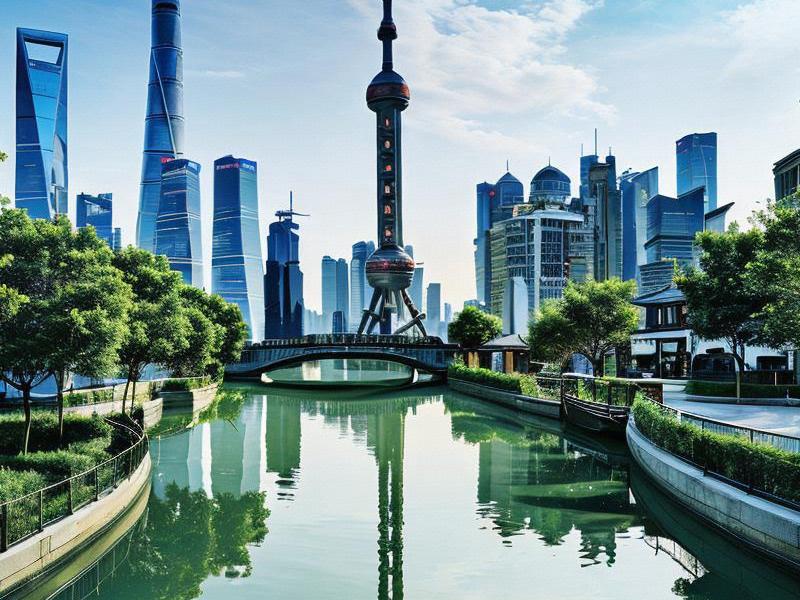
Shanghai, the bustling metropolis on the banks of the Huangpu River, has long been a symbol of China's rapid economic rise. Over the past few decades, it has transformed from a traditional port city into a global financial and technological powerhouse. However, as the city continues to grow, it faces the challenge of maintaining this momentum while addressing issues such as environmental sustainability and urban congestion.
One of the most remarkable aspects of Shanghai's transformation is its commitment to innovation. The city has established itself as a leading center for research and development, attracting top-tier talent and investment from around the world. The Zhangjiang Hi-Tech Park, often referred to as "China's Silicon Valley," is a testament to this dedication. Home to numerous high-tech companies, startups, and research institutions, the park has become a breeding ground for groundbreaking innovations in fields such as artificial intelligence, biotechnology, and information technology.
The city's government has also taken significant steps to foster a culture of innovation. Initiatives like the Shanghai Free-Trade Zone (FTZ) have created a favorable environment for businesses to experiment with new ideas and technologies. The FTZ offers tax incentives, streamlined regulations, and access to international markets, making it an attractive destination for multinational corporations and startups alike.
In addition to fostering innovation, Shanghai is also at the forefront of sustainability efforts. As one of the world's largest cities, it faces unique challenges related to pollution, energy consumption, and waste management. However, the city has demonstrated a strong commitment to addressing these issues through a combination of policy measures, technological advancements, and public awareness campaigns.
上海贵族宝贝龙凤楼 One of the key strategies employed by Shanghai is the promotion of green technology. The city has invested heavily in renewable energy sources such as solar and wind power, aiming to reduce its reliance on fossil fuels. For instance, the Shanghai Tower, the tallest building in China and the second-tallest in the world, incorporates a range of green technologies, including a double-skin facade that improves insulation and reduces energy consumption.
Shanghai is also making strides in the field of smart city development. The city has implemented a comprehensive smart grid system that integrates advanced sensors, data analytics, and automation to optimize energy distribution and reduce waste. This system not only enhances the efficiency of energy use but also helps to mitigate the impact of climate change by lowering greenhouse gas emissions.
Public transportation is another area where Shanghai has made significant progress in promoting sustainability. The city boasts one of the most extensive metro networks in the world, providing convenient and affordable travel options for millions of residents. In recent years, Shanghai has also introduced electric buses and bike-sharing programs to further reduce carbon emissions and encourage eco-friendly commuting habits.
爱上海同城对对碰交友论坛 Water management is yet another critical aspect of Shanghai's sustainability efforts. Located at the mouth of the Yangtze River, the city is particularly vulnerable to flooding and water pollution. To address these challenges, Shanghai has implemented a series of measures aimed at improving water quality and enhancing flood control capabilities. These include the construction of advanced wastewater treatment plants, the restoration of wetlands, and the development of smart water management systems.
Despite these impressive achievements, Shanghai recognizes that there is still much work to be done in achieving its sustainability goals. The city has set ambitious targets for reducing carbon emissions, increasing the share of renewable energy in its energy mix, and improving waste recycling rates. To achieve these objectives, Shanghai is collaborating with international partners, leveraging best practices from around the world, and continuously innovating to find new solutions.
One of the most promising areas of collaboration is the Belt and Road Initiative (BRI), a global development strategy proposed by China in 2013. Through the BRI, Shanghai is working with cities and regions across Asia, Europe, and Africa to promote sustainable infrastructure development and green technology transfer. This initiative not only enhances Shanghai's global influence but also contributes to the realization of the United Nations' Sustainable Development Goals (SDGs).
上海品茶论坛 Another important aspect of Shanghai's transformation is its focus on improving the quality of life for its residents. The city has invested heavily in education, healthcare, and cultural amenities, ensuring that its citizens enjoy a high standard of living. For example, Shanghai has established world-class universities and research institutions, attracting students and scholars from around the globe. The city's healthcare system has also undergone significant improvements, providing residents with access to cutting-edge medical services and facilities.
Cultural preservation is another priority for Shanghai. As the city undergoes rapid modernization, it is committed to preserving its rich historical and cultural heritage. Efforts have been made to restore and protect historic buildings, museums, and cultural landmarks, ensuring that future generations can appreciate the city's unique identity. At the same time, Shanghai is embracing its role as a global cultural hub, hosting international festivals, exhibitions, and events that showcase its diverse artistic and culinary traditions.
In conclusion, Shanghai's transformation is a story of resilience, innovation, and sustainability. The city has successfully navigated the challenges of rapid urbanization while maintaining its position as a global leader in finance, technology, and culture. By continuing to invest in green technologies, smart city solutions, and international collaborations, Shanghai is well on its way to achieving its vision of a prosperous, sustainable, and inclusive future.
As Shanghai looks to the future, it remains committed to balancing economic growth with environmental stewardship. The city's journey serves as an inspiration to other urban centers around the world, demonstrating that it is possible to achieve sustainable development without compromising on progress. With its vibrant economy, innovative spirit, and unwavering commitment to sustainability, Shanghai is poised to remain a beacon of hope and opportunity in the 21st century.
